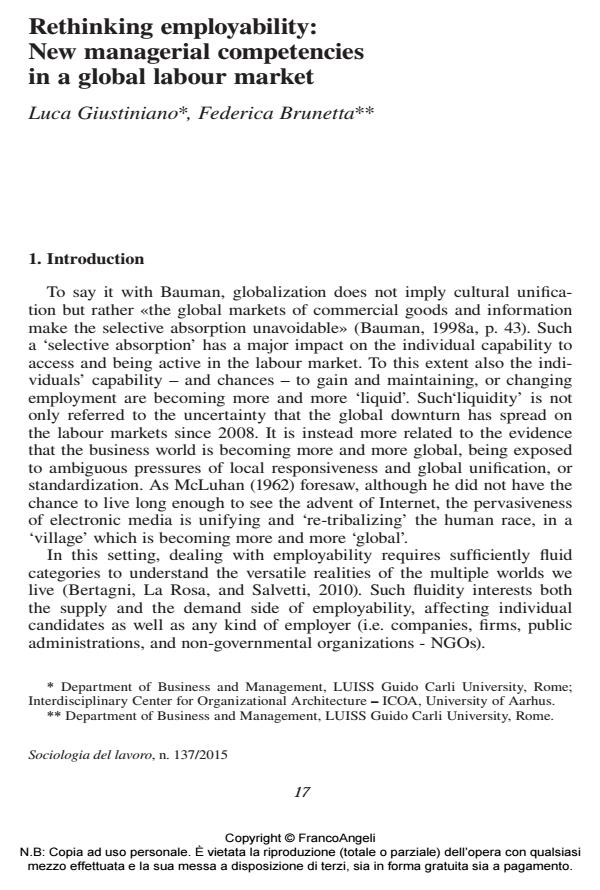Rethinking employability: New managerial competencies in a global labour market
Titolo Rivista SOCIOLOGIA DEL LAVORO
Autori/Curatori Luca Giustiniano, Federica Brunetta
Anno di pubblicazione 2015 Fascicolo 2015/137
Lingua Inglese Numero pagine 19 P. 17-35 Dimensione file 207 KB
DOI 10.3280/SL2015-137002
Il DOI è il codice a barre della proprietà intellettuale: per saperne di più
clicca qui
Qui sotto puoi vedere in anteprima la prima pagina di questo articolo.
Se questo articolo ti interessa, lo puoi acquistare (e scaricare in formato pdf) seguendo le facili indicazioni per acquistare il download credit. Acquista Download Credits per scaricare questo Articolo in formato PDF

FrancoAngeli è membro della Publishers International Linking Association, Inc (PILA)associazione indipendente e non profit per facilitare (attraverso i servizi tecnologici implementati da CrossRef.org) l’accesso degli studiosi ai contenuti digitali nelle pubblicazioni professionali e scientifiche
The ongoing consequences of globalization include widespread industry rationalization and heightened competition at regional, national, and international levels. In fact, the business world is becoming more networked and glocal. Such changes do not impact only on how companies and organizations run their own businesses. They also shape the way business schools grant their graduates a long-lasting employability. The paper reports the results of a vast research project on employability conducted by a major Italian business school in 2010-2014. The study involved more than 200 top managers and results were obtained via grounded approach. Surprisingly, the traditional hard skills-related subjects (accounting, marketing, finance) were considered as must-haves (prerequisites), whereas employability (meant as desired employees’ game changers) resulted to be increasingly associated with behavioral, cross-cultural and social soft skills.
I processi di globalizzazione stanno comportando la razionalizzazinoe dei modelli di business in molti settori, nonché l’inasprimento della competizione a livello regionale, nazionale e internazionale. L’arena in cui le imprese competono è sempre più connessa e glocale. Tali cambiamenti non interessano soltanto il mondo delle imprese ma investono anche alle business schools e il modo in cui queste generano employability. L’articolo riporta i risultati di un progetto di ricerca condotto dal 2010 al 2014 in una delle principali business school italiane. Lo studio ha coinvolto più di 200 figure aziendali di vertice. Sorprendentemente, le tradizionali hard skills relative ai canonici contenuti disciplinari della formazione manageriale (contabilità, marketing, finanza) sono state considerate quasi dei prerequisiti, mentre i fattori critici di successo sono risultati legati a quelle dimensioni comportamentali, cross-culturali e sociali generalmente ricondotte alle soft skills.
Parole chiave:Employability, forza lavoro, competenze, soft skills, formazione manageriale, imprese, approccio contingente
- La perception de la réalisation du contrat psychologique chez les ouvriers en situation de restructuration industrielle Christophe Estay, Catherine Mai-Nivoit, Zahir Yanat, François Durrieu, in Recherches en Sciences de Gestion /2020 pp.225
DOI: 10.3917/resg.139.0225 - Modeling Organizational Change Strategies Based on Skill Diversity y Simindokht Atapour, Seyed Mahdi Alvani, Omid Ardalan, in Journal of Management and Development Process /2022 pp.51
DOI: 10.52547/jmdp.35.2.51 - Work as promise for the subject of employability. Unpaid Work as New Form of Exploitation Emanuele Leonardi, Ekaterina Chertkovskaya, in SOCIOLOGIA DEL LAVORO 145/2017 pp.112
DOI: 10.3280/SL2017-145007 - FORMATION OF MANAGERIAL COMPETENCIES OF MANAGERS AND THEIR IMPACT ON THE COMPETITIVENESS OF THE FIRM AND THE LABOR MARKET IN UKRAINE І. Kychko , О. Parubets , А. Kholodnytska , V. Perminova , S. Lytvyn , in Financial and credit activity problems of theory and practice /2021 pp.284
DOI: 10.18371/fcaptp.v4i39.241317 - Professional Profiles and Job Requirements in Labour Demand: An Analysis of the Italian Information Technology Sector Paolo Mariani, Andrea Marletta, Mauro Mussini, Mariangela Zenga, in Social Indicators Research /2021 pp.651
DOI: 10.1007/s11205-020-02394-9
Luca Giustiniano, Federica Brunetta, Rethinking employability: New managerial competencies in a global labour market in "SOCIOLOGIA DEL LAVORO " 137/2015, pp 17-35, DOI: 10.3280/SL2015-137002